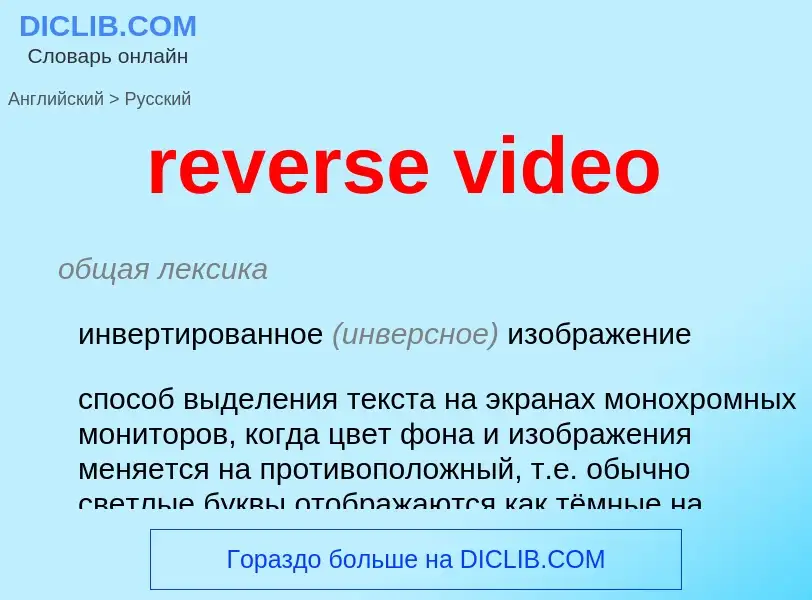Перевод и анализ слов искусственным интеллектом ChatGPT
На этой странице Вы можете получить подробный анализ слова или словосочетания, произведенный с помощью лучшей на сегодняшний день технологии искусственного интеллекта:
- как употребляется слово
- частота употребления
- используется оно чаще в устной или письменной речи
- варианты перевода слова
- примеры употребления (несколько фраз с переводом)
- этимология
reverse video - перевод на Английский
общая лексика
инвертированное (инверсное) изображение
способ выделения текста на экранах монохромных мониторов, когда цвет фона и изображения меняется на противоположный, т.е. обычно светлые буквы отображаются как тёмные на светлом фоне либо тёмные буквы отображаются как светлые на тёмном фоне
синоним
Смотрите также
общая лексика
аналоговое видео
передача видеоизображения с помощью аналоговых сигналов
антоним
Смотрите также
общая лексика
видеодиск, видео-CD
компакт-диск цифровой с записью видеофильма
общая лексика
(Voice Over Data) передача голоса поверх данных
синоним
Смотрите также
общая лексика
VOD, VoD
видео по запросу
система индивидуальной доставки абоненту телевизионных программ или видеофильмов по кабельной сети (или ISDN) с мультимедиа- или видеосервера, где они хранятся в сжатом (обычно в формате MPEG) виде
Смотрите также
общая лексика
потоковое видео
технология передачи видео через Интернет
синоним
Определение
Устройство для дистанционного ввода или вывода информации в вычислительных системах, оснащенное экраном визуального контроля.
Википедия

Reverse video (or invert video or inverse video or reverse screen) is a computer display technique whereby the background and text color values are inverted. On older computers, displays were usually designed to display text on a black background by default. For emphasis, the color scheme was swapped to bright background with dark text. Nowadays the two tend to be switched, since most computers today default to white as a background color. The opposite of reverse video is known as true video.
Video is usually reversed by inverting the brightness values of the pixels of the involved region of the display. If there are 256 levels of brightness, encoded as 0 to 255, the 255 value becomes 0 and vice versa. A value of 1 becomes 254, 2 of 253, and so on: n is swapped for r - n, for r levels of brightness. This is occasionally called a ones' complement. If the source image is of middle brightness, reverse video can be difficult to see, 127 becomes 128 for example, which is only one level of brightness different. The computer displays where it was most commonly used were monochrome and only displayed two values so this issue seldom arose.
Reverse video is commonly used in software programs as a visual aid to highlight a selection that has been made as an aid in preventing description errors, where an intended action is performed on an object that is not the one intended. It is more common in modern desktop environments to change the background to other colors such as blue, or to use a semi-transparent background to "highlight" the selected text.
On a terminal understanding ANSI escape sequences, the reverse video function is activated using the escape sequence CSI 7 m (which equals SGR 7).


![[[NTSC]] [[composite video]] signal (analog) [[NTSC]] [[composite video]] signal (analog)](https://commons.wikimedia.org/wiki/Special:FilePath/NTSC Signal.png?width=200)
![A [[VHS]] video cassette tape. A [[VHS]] video cassette tape.](https://commons.wikimedia.org/wiki/Special:FilePath/VHS-Video-Tape-Top-Flat.jpg?width=200)
![[[Composite video]](single channel RCA) [[Composite video]](single channel RCA)](https://commons.wikimedia.org/wiki/Special:FilePath/Composite-video-cable.jpg?width=200)
![[[S-Video]](2-channel YC) [[S-Video]](2-channel YC)](https://commons.wikimedia.org/wiki/Special:FilePath/Close-up_of_S-video_female_connector.jpg?width=200)
![[[Component video]](3-channel [[YPbPr]]) [[Component video]](3-channel [[YPbPr]])](https://commons.wikimedia.org/wiki/Special:FilePath/Component-cables.jpg?width=200)
![[[SCART]] [[SCART]]](https://commons.wikimedia.org/wiki/Special:FilePath/SCART_20050724_002.jpg?width=200)
![VGA]] VGA]]](https://commons.wikimedia.org/wiki/Special:FilePath/Vga-cable.jpg?width=200)
![TRRS]] TRRS]]](https://commons.wikimedia.org/wiki/Special:FilePath/3.5mm.jpg?width=200)
![[[D-Terminal]] [[D-Terminal]]](https://commons.wikimedia.org/wiki/Special:FilePath/D4_video_connector.jpg?width=200)
![[[Serial digital interface]] (SDI) [[Serial digital interface]] (SDI)](https://commons.wikimedia.org/wiki/Special:FilePath/BNC_connector_%28male%29.jpg?width=200)
![[[Digital Visual Interface]] (DVI) [[Digital Visual Interface]] (DVI)](https://commons.wikimedia.org/wiki/Special:FilePath/Dvi-cable.jpg?width=200)
![[[HDMI]] [[HDMI]]](https://commons.wikimedia.org/wiki/Special:FilePath/HDMI-Connector.jpg?width=200)
![[[DisplayPort]] [[DisplayPort]]](https://commons.wikimedia.org/wiki/Special:FilePath/Displayport-cable.jpg?width=200)
![“Copy Protected” logo on a VCD package produced in [[Hong Kong]]. “Copy Protected” logo on a VCD package produced in [[Hong Kong]].](https://commons.wikimedia.org/wiki/Special:FilePath/Copy Protected VCD.jpg?width=200)

![As of 2014, VCDs and DVDs are the norm for home media in the [[Philippines]]. Blu-ray discs are also available but are only displayed at small separate shelves at the counter. As of 2014, VCDs and DVDs are the norm for home media in the [[Philippines]]. Blu-ray discs are also available but are only displayed at small separate shelves at the counter.](https://commons.wikimedia.org/wiki/Special:FilePath/VCD and DVD Stock.jpg?width=200)
![Some VOD services require the viewer to have a TV set-top box. This photo shows the set-top box for the Jazzbox VOD service and its accompanying [[remote control]]. Some VOD services require the viewer to have a TV set-top box. This photo shows the set-top box for the Jazzbox VOD service and its accompanying [[remote control]].](https://commons.wikimedia.org/wiki/Special:FilePath/Jazzbox.jpg?width=200)


![[[Chroma keying]], commonly done with a [[green screen]], allows a subject to appear composited against the background. [[Chroma keying]], commonly done with a [[green screen]], allows a subject to appear composited against the background.](https://commons.wikimedia.org/wiki/Special:FilePath/Green screens compare with Iman Crosson 20110524.png?width=200)
![[[Kdenlive]] is a free and open source video editor [[Kdenlive]] is a free and open source video editor](https://commons.wikimedia.org/wiki/Special:FilePath/Kdenlive 20.04.1.png?width=200)

